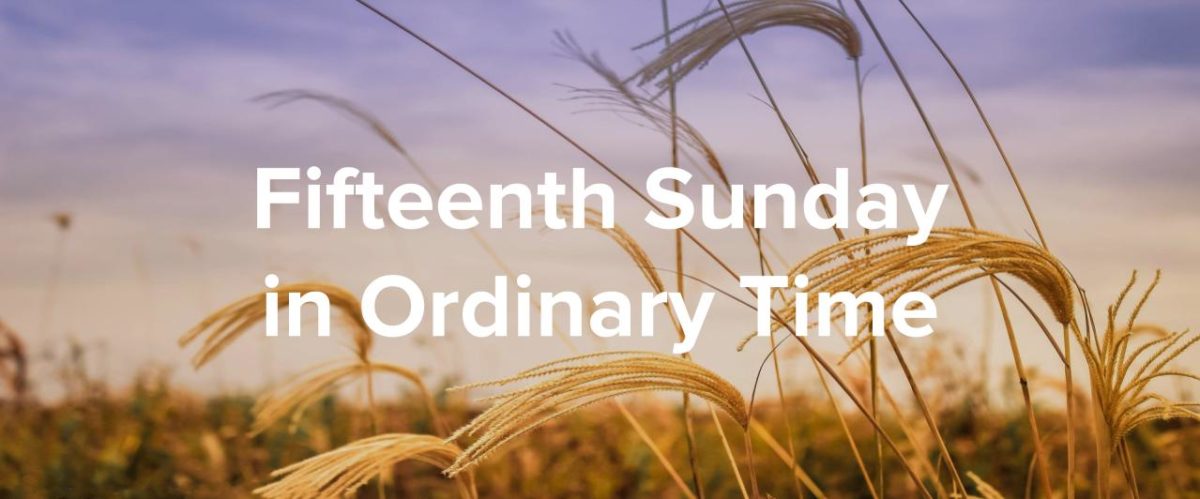
Fifteenth Sunday in Ordinary Time Year A (16 July 2017)
Isaiah 55:10-11; Ps. 65:10-14; Rom. 8:18-23; Matthew 13:1-23.
Theme: A Hundredfold!
Chapter 13 of Matthew is a collection of parables attributed to Jesus, seven in all. Today’s Gospel reading deals with the first and longest of these, the parable of the sower. The remaining six will be offered for our reflection over the next two Sundays.
The Hebrew term mashal (translated parabolé in Greek, e.g. in Psalm 78:2 in LXX, hence parable in English) has a wide range of meanings: proverb, wisdom saying, riddle, parable, allegory etc. Amy-Jill Levine refers to the parables as ‘Jesus’ provocative stories’ [Levine 1] and this is in line with John Dominic Crossan’s convincing argument that Jesus’ parables were meant to shock his listeners into a new way of seeing things [Crossan 90-93]. To read them as moral stories or to allegorize them is to rob them of much of their power to transform our minds and hearts. Many scholars think that the process of domesticating them began in the early church as witnessed by the fact that a few of them, and the parable of the sower is one, are accompanied by allegorical explanations. Other scholars however, Raymond Brown among them, think that the allegorical explanations in the Gospels (there are three of them in Matthew 13) might well go back to Jesus, who would not have made the sharp distinction between parable and allegory that we now make.
An allegory, in which each element represents something in real life, appeals to our reason and intelligence, the right side of our brains. A parable on the other hand is a left-brain story that tries to engage our imagination with exaggeration and a totally unexpected outcome. Kenneth Bailey describes a parable as a house in which we are invited to dwell, and through whose windows we are invited to see the world differently [Bailey 280-281].
In any case the surprise ending of today’s parable, the ‘Wow!’ factor, lies in the ridiculously large yields from the seed sown in good soil – up to a hundredfold! The only verse in the Hebrew Bible that mentions a hundredfold yield of grain is Genesis 26.12 where it describes YHWH”s bounteous blessing bestowed on Isaac. Seth Schwarz, historian and researcher at the Jewish Theological Seminary NY, estimates that crop yields for wheat in ancient Palestine ranged from four to eight-fold, with the yields for barley somewhat higher [Schwartz 41]. From the Mishnah we learn that in a poor year the yield might be equivalent only to what had been sown [Baba Metzi‘a 9.5; Hamel 147]. This grain would be kept for sowing the following year, so no net return. Imagine the shock value then of a thirty or sixty-fold yield, let alone a hundred! What kind of seed could possibly produce that, and what kind of soil? What does it all mean? Jesus’ listeners, and ourselves in turn, are invited to wrestle with these questions, and to ponder on what the parable could possibly mean for our own lives and for our world.
For Reflection and Discussion: 1. Reflect on ways in which you have experienced the hundredfold return on the seed planted in the good soil of your own heart. 2. In what ways could you see this parable as relevant to our world today?
Bibliography: Bailey, Jesus Through Middle Eastern Eyes (London, 2008); Brown, New Testament Essays (London, 1965); Crossan, The Dark Interval: towards a theology of story (Allen TX 1975); Hamel, Poverty and Charity in Roman Palestine (Berkerley CA, 1990); Levine, Short Stories by Jesus (New York NY, 2014); Schwartz, ‘Political, Social and Economic Life in the Land of Israel 66-c.235’ in Katz, (ed.), The Cambridge History of Judaism Volume 4 (Cambridge UK, 2006).
This week’s Sunday Gospel Commentary was prepared by
Br Kevin McDonnell cfc, PhD., Australia, Bat Kol Alumnus, 2003, 2004, 2005.
Email address: klmcdonnell@edmundrice.org
[Copyright © 2017]
…………………………………………………………………………
PLEASE NOTE: The weekly Gospel commentaries represent the research and creative thought of their authors, and are meant to stimulate deeper thinking about the meaning of the Sunday Scriptures. While they draw upon the study methods and sources employed by the Bat Kol Institute, the views and conclusions expressed in these commentaries are solely those of their authors, and do not necessarily represent the views of Bat Kol. Questions, comments and feedback are always welcome
…………………………………………………………………………
Bat Kol Institute for Jewish Studies, Jerusalem
1983-2017
“Christians Studying the Bible within its Jewish milieu, using Jewish Sources.”
gill@batkol.info Website: www.batkol.info



